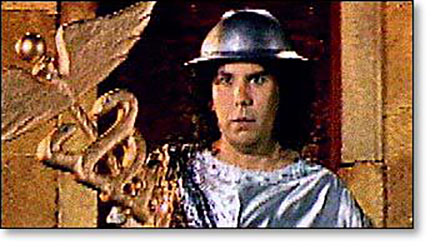Hermes (HUR-meez). Roman name Mercury. A prankster and inventive genius from birth, Hermes was the messenger of the gods and guide of dead souls to the Underworld. He aided the heroes Odysseus and Perseus in their quests.
 Hermes was the son Zeus and a mountain nymph. As a newborn he was remarkably precocious. On his very first day of life, he found the empty shell of a tortoise and perceived its utility as a sounding chamber. Stringing sinews across it, he created the first lyre.
Hermes was the son Zeus and a mountain nymph. As a newborn he was remarkably precocious. On his very first day of life, he found the empty shell of a tortoise and perceived its utility as a sounding chamber. Stringing sinews across it, he created the first lyre.
 Hermes was known for his helpfulness to mankind, both in his capacity as immortal herald and on his own initiative. When Perseus set out to face the Gorgon Medusa, Hermes aided him in the quest. According to one version of the myth, he loaned the hero his own magic sandals, which conferred upon the wearer the ability to fly. Some say that Hermes loaned Perseus a helmet of invisibility as well. Also known as the helmet of darkness, this was the same headgear that Hermes himself had worn when he vanquished the giant Hippolytus. This was on the occasion when the gargantuan sons of Earth rose up in revolt against the gods of Olympus.
Hermes was known for his helpfulness to mankind, both in his capacity as immortal herald and on his own initiative. When Perseus set out to face the Gorgon Medusa, Hermes aided him in the quest. According to one version of the myth, he loaned the hero his own magic sandals, which conferred upon the wearer the ability to fly. Some say that Hermes loaned Perseus a helmet of invisibility as well. Also known as the helmet of darkness, this was the same headgear that Hermes himself had worn when he vanquished the giant Hippolytus. This was on the occasion when the gargantuan sons of Earth rose up in revolt against the gods of Olympus.
 Hermes' symbol of office as divine messenger was his staff, or caduceus. This was originally a willow wand with entwined ribbons, traditional badge of the herald. But the ribbons were eventually depicted as snakes. To support this mythologically, a story evolved that Hermes used the caduceus to separate two fighting snakes which forthwith twined themselves together in peace.
Hermes' symbol of office as divine messenger was his staff, or caduceus. This was originally a willow wand with entwined ribbons, traditional badge of the herald. But the ribbons were eventually depicted as snakes. To support this mythologically, a story evolved that Hermes used the caduceus to separate two fighting snakes which forthwith twined themselves together in peace.
 It was Hermes' job to convey dead souls to the Underworld. And as patron of travelers, he was often shown in a wide-brimmed sun hat of straw. Hermes was known to the Romans as Mercury. His most famous depiction, a statue by Bellini, shows him alight on one foot, wings at his heels, the snaky caduceus in hand and, on his head, a rather stylized combination helmet-of-darkness and sun hat.
It was Hermes' job to convey dead souls to the Underworld. And as patron of travelers, he was often shown in a wide-brimmed sun hat of straw. Hermes was known to the Romans as Mercury. His most famous depiction, a statue by Bellini, shows him alight on one foot, wings at his heels, the snaky caduceus in hand and, on his head, a rather stylized combination helmet-of-darkness and sun hat.
|



